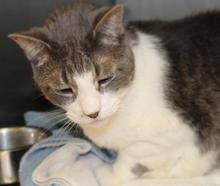This article was prepared by the Cheyenne Animal Shelter's education committee. As a member of their Board of Directors, it has been my privilege to help in the wonderful cause that they champion. If you have a desire to help animals in need, please consider helping the Cheyenne Animal Shelter. Mark your calendars for June 13 and 14. The Cheyenne Animal Shelter, in conjunction with the Northern Colorado Friends of Ferals, will hold a Trap-Neuter-Release event for feral cats in the Cheyenne area. Please call the Shelter at 307-632-6655 for more information, or go to www.cheyenneanimalshelter.org.
We all know cats multiply and we should know that a pair of breeding cats can produce many, many kittens in just seven years. The unhappy result is booming feral cat colonies, too many "free kittens" ads, and too many cats being euthanized.
There are several types of cats that cause problems. Feral cats have never had owners and have fully reverted to the wild state, often in one generation. Strays are pets that have wandered off and can be mistaken for feral; the recovery rate for strays is a dismal three percent. Barn cats often are not afraid of people, but frequently are allowed to breed like ferals and their kittens are not tame. There are pet cats that roam outside but return home regularly, in violation of Cheyenne’s leash law. These cats have one thing in common: unless neutered or spayed, they are the source of the many kittens arriving at the animal shelter every week.
There are several types of cats that cause problems. Feral cats have never had owners and have fully reverted to the wild state, often in one generation. Strays are pets that have wandered off and can be mistaken for feral; the recovery rate for strays is a dismal three percent. Barn cats often are not afraid of people, but frequently are allowed to breed like ferals and their kittens are not tame. There are pet cats that roam outside but return home regularly, in violation of Cheyenne’s leash law. These cats have one thing in common: unless neutered or spayed, they are the source of the many kittens arriving at the animal shelter every week.
There are good reasons to be opposed to cats running at large. They kill birds, and everybody loves birds. They skulk around and shriek or fight. But this is the result of their situation more than their nature. Love them or hate them, cats have a place in the world. Sadly, it’s a crowded place.
What can responsible people do to turn this regrettable situation around? First, spay and neuter your own cats and keep them inside. The advantages are numerous. Males won’t spray your walls and bushes or fight for territory. Females won’t attract suitors to your house. Letting your kids witness the "miracle of birth" is not a good reason to let your cat have a litter if all they learn from the experience is that cats are disposable. If cost is a factor, the Big Fix program administered by the Shelter offers low-cost neutering to income-eligible families.
Second, support and use the Cheyenne Animal Shelter’s cat programs. These include adoption, foster homes, the barn cat program and the TNR program. The Cheyenne Animal Shelter’s mission includes all animals, no matter their condition or adoption potential. They take in cats and kittens rescued from the streets, living in a hollow tree, or born on your closet floor. Kittens become terrific pets if socialized early, but foster families are always needed. A friendly, well-socialized kitten has an excellent chance of being adopted.
The barn cat program does two things. People in the country can capture the cats that inevitably turn up in their barns and take them to the animal shelter for neutering and rabies vaccination. It costs only $30 per cat. The cat goes back to its barn afterwards, where it will defend its territory, but not reproduce or risk rabies.
The Shelter also has suitable barn cats available for adoption. If you need barn cats, don’t get free kittens from newspaper ads! Instead, you can adopt a barn cat from the Shelter that’s already neutered, vaccinated and microchipped. You won’t have to advertise free kittens, or worse, have to drop off litters of adorable, innocent kittens at the Shelter when those "free kittens" start reproducing. .
Perhaps the biggest advance the Cheyenne community has made is the "Trap, Neuter, Release [TNR]" program. Members of feral cat colonies are trapped, neutered, vaccinated, ear-tipped, and released where they were trapped. Young kittens are diverted for adoption. The end result is a healthy, non-reproducing colony that will not expand or form satellite colonies and whose population will dwindle by attrition.
On June 13-14, 2015, Northern Colorado Friends of Ferals will partner with the Shelter to hold a TNR event here in Cheyenne. Volunteers will trap cats at colony sites, take them to Fort Collins for surgery, and return them to their respective colonies. A donation of $15 per cat is requested but not required. Barn cats are welcome.
Love cats, hate them, or feel neutral about them, we can all agree that cat overpopulation is not good for our community. With the support and cooperation of the community and city and county governments, the Cheyenne Animal Shelter continues to work on specific initiatives to prevent it.
What can responsible people do to turn this regrettable situation around? First, spay and neuter your own cats and keep them inside. The advantages are numerous. Males won’t spray your walls and bushes or fight for territory. Females won’t attract suitors to your house. Letting your kids witness the "miracle of birth" is not a good reason to let your cat have a litter if all they learn from the experience is that cats are disposable. If cost is a factor, the Big Fix program administered by the Shelter offers low-cost neutering to income-eligible families.
Second, support and use the Cheyenne Animal Shelter’s cat programs. These include adoption, foster homes, the barn cat program and the TNR program. The Cheyenne Animal Shelter’s mission includes all animals, no matter their condition or adoption potential. They take in cats and kittens rescued from the streets, living in a hollow tree, or born on your closet floor. Kittens become terrific pets if socialized early, but foster families are always needed. A friendly, well-socialized kitten has an excellent chance of being adopted.
The barn cat program does two things. People in the country can capture the cats that inevitably turn up in their barns and take them to the animal shelter for neutering and rabies vaccination. It costs only $30 per cat. The cat goes back to its barn afterwards, where it will defend its territory, but not reproduce or risk rabies.
The Shelter also has suitable barn cats available for adoption. If you need barn cats, don’t get free kittens from newspaper ads! Instead, you can adopt a barn cat from the Shelter that’s already neutered, vaccinated and microchipped. You won’t have to advertise free kittens, or worse, have to drop off litters of adorable, innocent kittens at the Shelter when those "free kittens" start reproducing. .
Perhaps the biggest advance the Cheyenne community has made is the "Trap, Neuter, Release [TNR]" program. Members of feral cat colonies are trapped, neutered, vaccinated, ear-tipped, and released where they were trapped. Young kittens are diverted for adoption. The end result is a healthy, non-reproducing colony that will not expand or form satellite colonies and whose population will dwindle by attrition.
On June 13-14, 2015, Northern Colorado Friends of Ferals will partner with the Shelter to hold a TNR event here in Cheyenne. Volunteers will trap cats at colony sites, take them to Fort Collins for surgery, and return them to their respective colonies. A donation of $15 per cat is requested but not required. Barn cats are welcome.
Love cats, hate them, or feel neutral about them, we can all agree that cat overpopulation is not good for our community. With the support and cooperation of the community and city and county governments, the Cheyenne Animal Shelter continues to work on specific initiatives to prevent it.



 RSS Feed
RSS Feed